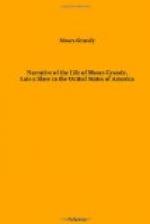Next morning we set off, and found master at Major Farrence’s, at the cross canal, where I knew he was to be that day, to sell his share of the canal. When I saw him, he told me to go forward home, for he would not sell me. I felt sick and sadly disappointed. Captain Minner stepped up to him, and showed him the paper he had given me, saying, ‘Mr. Sawyer, is not this your hand-writing?’ He replied, ’Mistress said, the last word when I came away, I was not to sell him, but send him home again.’ Captain Minner said, ’Mind, gentlemen, I do not want him for a slave; I want to buy him for freedom. He will repay me the money, and I shall not charge him a cent of interest for it. I would not have a colored person, to drag me down to hell, for all the money in the world.’ A gentleman who was by said it was a shame I should be so treated; I had bought myself so often that Mr. Sawyer ought to let me go. The very worst man as an overseer over the persons employed in digging the canal, Mr. Wiley M’Pherson, was there; he was never known to speak in favor of a colored person; even he said that Mr. Sawyer ought to let me go, as I had been sold so often. At length, Mr. Sawyer consented I should go for $650, and would take no less. I wished Captain Minner to give the extra $50, and not stand about it. I believe it was what M’Pherson said that induced my master to let me go; for he was well known for his great severity to colored people; so that after even he had said so, master could not stand out. The Lord must have opened M’Pherson’s heart to say it.
I have said this M’Pherson was an overseer where slaves were employed in cutting canals. The labor there is very severe. The ground is often very boggy; the negroes are up to the middle, or much deeper, in mud and water, cutting away roots and baling out mud; if they can keep their heads above water, they work on. They lodge in huts, or, as they are called, camps, made of shingles or boards. They lie down in the mud which has adhered to them, making a great fire to dry themselves, and keep off the cold. No bedding whatever is allowed them; it is only by work done over his task that any of them can get a blanket. They are paid nothing, except for this overwork. Their masters come once a month to receive the money for their labor; then, perhaps, some few very good masters will give them $2 each, some others $1, some a pound of tobacco, and some nothing at all. The food is more abundant than that of field slaves: indeed, it is the best allowance in America—it consists of a peck of meal and six pounds of pork per week; the pork is commonly not good; it is damaged, and is bought, as cheap as possible, at auctions.




